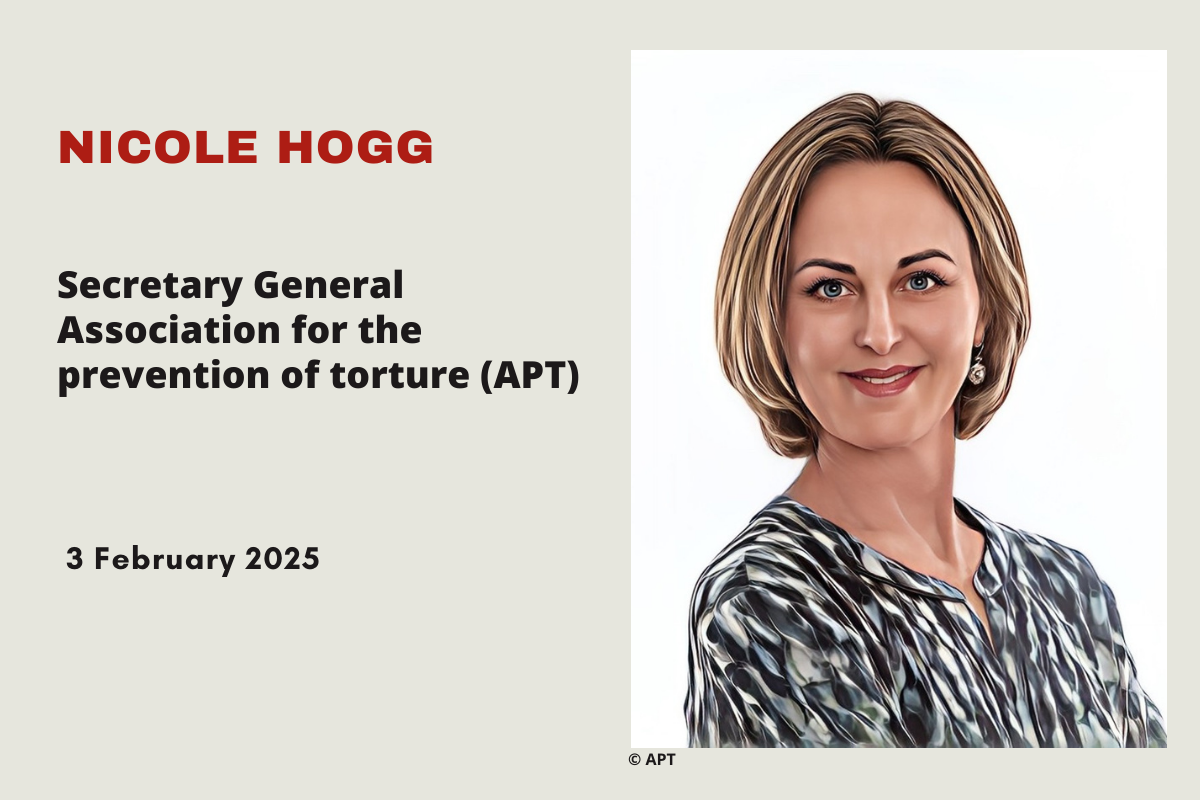The interview | Nicole Hogg
 |
|
I am proud of the APT’s long and successful history of action to prevent torture and ill-treatment, together with our partners around the world. APT has been operating for 48 years and helped contribute to the situation today where there is more oversight and independent monitoring, in more countries, of places where people are deprived of their liberty. These measures, together with other safeguards at various moments when people are in contact with the criminal justice system, are proven to help protect people from torture and ill-treatment, and it makes me proud to be associated with these developments.
If I think about what I am most proud of though, it is the APT team, whose knowledge, experience, commitment and passion inspire me every day. I feel very lucky to be working for such an organisation and with such an impressive team.
 |
|
Despite the progress I just mentioned, the reality is that torture and ill-treatment are still occurring way too often across the globe. In many contexts, there is a hardening of attitudes and a weakened commitment to human rights. Without strong political will and financial backing, torture prevention work can be very challenging. This is not the case everywhere, but it is a worrying trend.
The financial environment for international NGOs like ours is evolving, with donors facing increasing pressures and competing priorities. As a small NGO, we must carefully prioritise how we respond to requests for support, ensuring we focus our resources where they can have the greatest impact. Multi-year funding remains invaluable, enabling us to plan effectively, enhance efficiency and maintain sustainable programmes.
 | Among the concentration of actors based in Geneva (IOs, NGOs, permanent missions, academia, private sector or others), who do you work with and how? |
The APT is very much a Geneva-based organisation, even if our reach is international.
The APT has a long history of engaging with the UN, contributing to the development of key treaties and standards including the Optional Protocol to the UN Convention against torture (OPCAT), and actively participating in the drafting of Human Rights Council resolutions on issues such as torture prevention, women in detention, and peaceful protests. Regularly interacting with UN Treaty Bodies, Special Procedures and Mechanisms, we also deliver oral statements, organize side events and collaborate with various actors to advance torture prevention and human rights.
We maintain strong relationships with several Permanent Missions in Geneva, and the group of core states for the Convention Against Torture Initiative (CTI), with whom we have a strategic partnership. We collaborate on important advocacy initiatives, such as the Principles on Effective Interviewing for Investigations and Information Gathering, otherwise known as the “Méndez Principles”.
Naturally, we also have a close network of other INGOs in the human rights field. Since 2023, we formalised our collaboration with five other leading anti-torture organisations in the United Against Torture Consortium. Alongside these global partnerships, the APT also engages at the local level, working with authorities such as the Commune of Chêne-Bougeries and collaborating with academic institutions like the Geneva Academy of International Humanitarian Law and Human Rights.
 |
|
Besides being a beautiful city, one of Geneva’s strengths is its role as an international hub for human rights where like-minded people can concentrate and support each other’s efforts. The unique ecosystem in Geneva fosters collaboration and innovation, bringing together states, NGOs, academics and civil society to address pressing global challenges.
The risk is that sometimes ‘international Geneva’ can feel like a bubble, a little removed from the realities of peoples’ lives in many places. In this environment, it is important to always remember to try to keep people at the centre of our work, listening and learning from their lived experiences, beyond the diplomatic world.
 |
|
In my work, I am privileged to be able to meet a lot of inspiring people. One of them was Gladys Ambort, a Swiss Argentinian bi-national, who was detained aged just 17 in the 1970s in Argentina for political reasons and kept in isolation. Today living in Geneva, Ms. Ambort spoke at the 5th Jean-Jacques Gautier Conference co-organised between APT and the Commune of Chêne-Bougeries in October 2024.
I remember initially wondering if I was up for an evening dedicated to such a heavy topic after a long day. In fact, I was completely engrossed by Ms. Ambort’s moving testimony, which underscored the physical and psychological harm caused by solitary confinement, including its long-lasting impact. Her generosity in sharing her story to a room full of strangers, as well as her humanity, strength, wisdom and humour, renewed my energy and served as an important reminder that what really matters in life is kindness and human connection.
